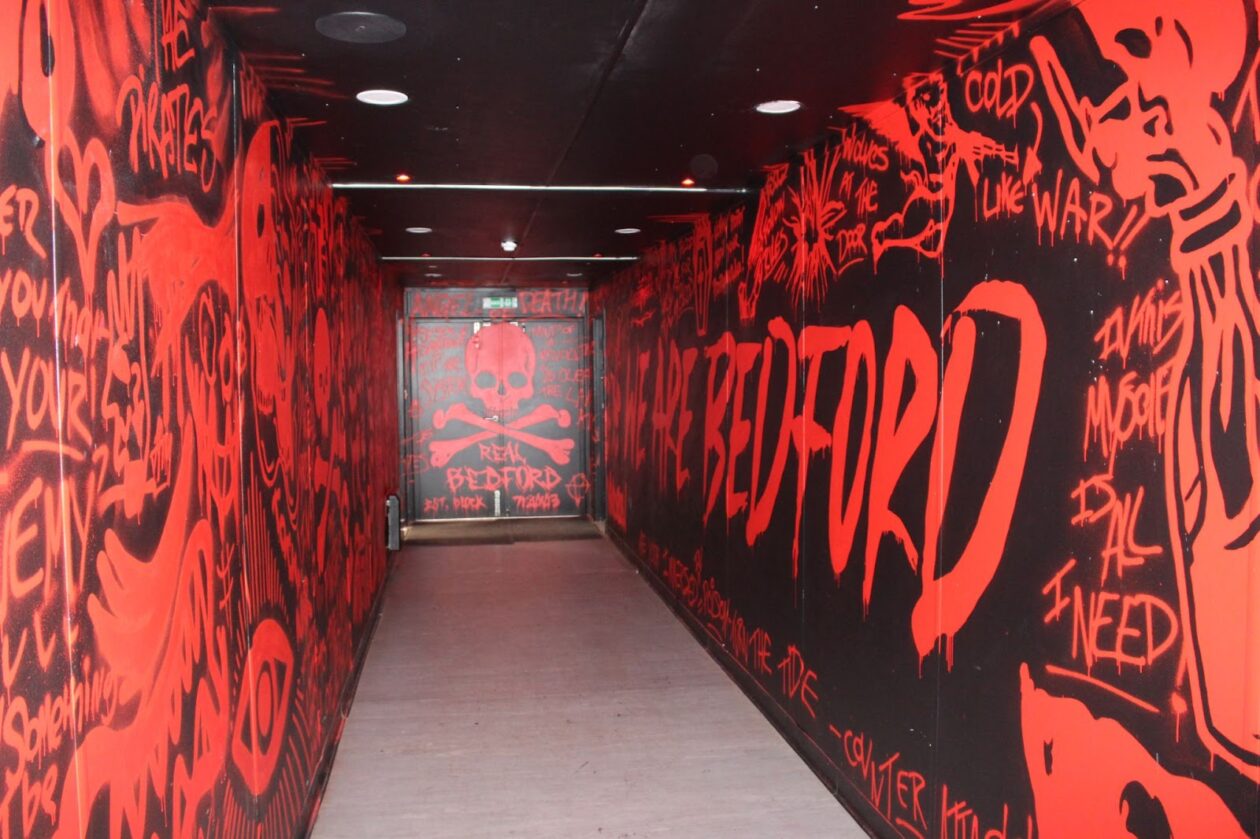The team in bright orange, a skull and crossbones on their chests, walked onto the field of play, their anthem — “Know Your Enemy” by U.S. rap metal band Rage Against the Machine — drowning out the cheers of the 150 or so fans in attendance.
It was a suitably rock-n-roll start to a first round cup game for Real Bedford, the world’s first Bitcoin-funded football team. The club, based in Bedford, a market town with a population of 170,000 in Bedfordshire, England, is the passion project of local owner and Bitcoin evangelist Peter McCormack.
The host of the “What Bitcoin Did” podcast — a Bitcoin-based current affairs show that positions the cryptocurrency as a remedy for socioeconomic issues such as rising inflation and state debt — spoke animatedly on the day of the match about the changes the club has seen under his ownership, and the role that Bitcoin has played in it.
“Teams should care about something,” he said. “Every club has a history of where it came from. It’s usually the community they were in.” His ownership has brought with it the international reach and decentralized philosophy of Bitcoin — a “global community that cares about hard working people not having the fruits of their labor debased by government mismanagement of money,” he added.
But financial reliance on a cryptocurrency brings with it certain complications — including market volatility and industry implosions beyond the Real Bedford owner’s control.
Bear market
McCormack completed the purchase of Real Bedford — a South Midlands Division One side then known as Bedford FC — in April 2022 on the back of various business ventures linked to Bitcoin. He said at the time of the takeover that, with Bitcoin-backed financing, he wants to put the club in a position to rise nine tiers to the Premier League — the pinnacle of English football.
3/ So what is the plan? To get our club into the Premier League, 9 promotions…
— Peter McCormack🏴☠️ (@PeterMcCormack) December 16, 2021
…I am a bitcoiner, we aim big. If we can separate money and state, we can get a football club into the Premier League. pic.twitter.com/uQu4i0l90v
He started the process of buying the club in December 2021, near the peak of the last crypto bull market. But in March 2022, the U.S. Federal Reserve began raising interest rates. Then in May that year, stablecoin platform Terra-Luna collapsed, followed by the FTX cryptocurrency exchange in November. A bear market mentality settled over the crypto industry as investors shied away from riskier assets, including Bitcoin. Prices dropped, while over US$2 trillion was wiped off the wider market.
From a high of almost US$70,000, Bitcoin’s price plummeted to less than US$16,000 by the end of 2022. While it recovered some of that ground to trade within the US$26,000 range as of early September, analysts expect macroeconomic concerns to continue to weigh on the token’s price — at least in the short term.
“The main headwind for crypto is rising real interest rates,” said Samuel Lee, founder of U.S.-based SVRN Asset Management, an investment advisory firm. “It’s unlikely we’ll see a sustained resurgence until interest rates drop back down again and people forget about the trauma and folly of the last bubble.”
Could an extended period of crypto winter combined with further declines in the price of Bitcoin impact Real Bedford?
“That doesn’t worry me because I fundamentally believe there’s a far higher chance of the pound failing than Bitcoin,” McCormack said. “I think a more important question is: is the club sustainable if we don’t keep winning?”
Local link
As the referee blew his whistle for the start of last week’s game at McMullen Park, the realities of ninth-tier English football set in. With the music off, the fans quietened down, their cheers replaced by the sound of the wind blowing through the trees lining the ground and a motorway running opposite. It was a long way from the glamor of the Premier League.
“Bedford isn’t really known for anything,” said McCormack, 44, who has lived in the town most of his life. “If a tourist comes to the U.K., most people go to London or Manchester or Bath. There’s no reason to come to Bedford.”
Mark Anderson, a local software engineer who volunteers at the club on Saturdays, was more direct. “Bedfordshire is basically the arse-end of the nice bits,” he said, referring to the county’s location north of Greater London on the periphery of some of Britain’s most desirable real estate.
But it is McCormack’s connection to the local area, the Real Bedford owner said, that gives him an advantage over other sporting ownership models backed by digital assets.
“This has meaning to me because it’s my town,” he said. “It’s the most important thing I’m doing. The town of Bedford should have a team in the Football League.”
He pointed to fourth-tier English football team Crawley Town — bought by U.S. crypto consortium WAGMI United in April 2022 — as an example of an ownership model without a link to the local community. WAGMI, like McCormack, promised to take the club to the pinnacle of English football. But rather than Bitcoin, they planned to use sales of non-fungible tokens (NFTs) to build Crawley’s brand and establish an international fan base.
The project got off to a promising start, earning £3.5 million (US$4.4 million) from its first NFT drop. But against the backdrop of last year’s turbulence in the crypto market, the new owners became increasingly involved in day-to-day footballing operations — including a brief stint on the coach’s bench for co-owner Preston Johnson. The club went into a tailspin, suffering its worst finish in twelve years in the football league and narrowly avoiding relegation.
While WAGMI United didn’t respond to a request for comment, Reuben Watt, Chair of the Crawley Town Supporters Alliance, said that by the end of last season, confidence in the group’s ownership was at an “all-time low.” He worried that the owners had consistently focused on pleasing NFT holders over local fans.
Concern among fans appears to have sunk in. WAGMI appointed Sam Jordan, a member of the Supporter’s Alliance, to the board of directors in August.
“I think the appointment of Sam to the club’s board is a huge turning point for the club,” said Watt. “Had WAGMI got in someone with knowledge of English football straight away and put a fan on the board, then we would’ve been in a better situation.”
McCormack didn’t hold back in his criticism of the Crawley owners. “I think they bought it as a toy,” he said. “They bought a toy under the hype, probably watched a bunch of Ted Lasso and got excited. They’ve done a terrible job.”
He also identified issues with the WAGMI group’s association with crypto assets like meme coins and NFTs — which are fundamentally different, he said, to Bitcoin — as another flaw in its business model.
“They basically want to just get people to buy crap that will lose value — which has been proven historically — whereas for us, Bitcoin is a monetary asset,” he said.
“This war we see between Bitcoin and crypto is reflected in the ethos of how we run our clubs. Bitcoin is in our DNA, but we’re also about building that feeling around the town that this is a community thing,” he added.
Bitcoin backers
Last season, Real Bedford won its division at a canter, earning promotion to the South Midlands Premier Division. Much of the financing behind that run came from large-scale sponsorship. The club has partnership agreements with a host of Bitcoin companies, including Iris Energy, a sustainable Bitcoin mining firm; Galaxy, a crypto firm dealing in corporate finance; and Gemini, a cryptocurrency exchange.
According to the club’s records, sponsorship provided £387,900 (US$491,000) out of the club’s £549,507 (US$696,000) revenue in the 22/23 season — a significant amount given that ninth-tier clubs typically only have sponsorship deals in the four to five figure range.
The revenue brought in through tie-ups with the likes of Gemini — who, according to a spokesperson, view the Real Bedford partnership as a form of Bitcoin-backed community building — allows the club to make improvements to its facilities and player welfare in a way unmatched by the league’s other teams.
And while the sponsorship revenue gives the club a huge advantage in its ability to attract players, the Bitcoin connection also acts as a magnet for attracting supporters from further afield — football fans who may not otherwise have chosen Bedford as a place to spend their Saturday afternoons.
“Over the last year, over 100 people have come in from other countries to watch the games here,” McCormack says. “We had 12 come in from Slovakia! That’s insane! And they’re spending money in the hotels, in the bars, in the restaurants — that money supports our local economy.”
The 256% rise in matchday attendances since the takeover has put a strain on facilities unready for the increased level of interest. The club were averaging just 40 attendees per week when McCormack took over, whereas CEO Emma Firman wrote in the week’s program notes that the club is now working with local businesses to expand its designated parking for the game.
“Our match days are getting busier, which is exciting for everyone here at the club as more people recognise our exciting project at McMullen Park,” she wrote.
Sustainable growth
But for all the club’s progress, the club’s ownership model is reliant on Bitcoin-affiliated sponsors impacted by the ongoing bear market.
The club still sits five rungs below McCormack’s medium-term target of the Football League — tiers 2 to 4 — where budgets of newly promoted sides are £1-3 million. Getting there will require sustained success for the next half-decade — not just for the team, but for Bitcoin-backed sponsors who will have to weather any further market volatility and declines in the token’s price.
Companies across the sector have been forced to push through large-scale layoffs over the past year, with Real Bedford’s main sponsor Gemini undergoing three consecutive rounds of job cuts between July 2022 and January 2023. Their spending on TV and digital advertisements alone fell from US$3.8 million to US$478,000 between May and November 2022, according to the Wall Street Journal.
“Crypto sponsor’s rich marketing budgets depended on the huge crypto bubble that allowed them to raise money effortlessly,” said SVRN’s Samuel Lee.
“With the collapse in crypto prices and waning interest in crypto, money is unsurprisingly tight. I think crypto companies are starting to realize that the payoff for expensive sports sponsorships isn’t as high as they thought,” Lee added.
McCormack said that he personally has little concern for a Bitcoin price drop. The U.K. economy and the pound are more vulnerable to volatility in light of the government’s debt burden, he said. But he did stress the importance of achieving stability beyond a reliance on Real Bedford’s Bitcoin backers.
One way to do that, he said, is by growing crowds through a brand of football fans can engage with. That starts with the club’s skull-heavy rebrand as The Pirates and a ramped up social media presence that leans heavily into the idea of the world’s first Bitcoin-backed team as rock-n-roll disruptors.
“You give people a brand of football they can support,” McCormack said. “We have skulls. Skulls are f–king cool. We play heavy metal when they come on the pitch. And have you seen our tunnel?”
Bitcoin in the community
The team’s brand also involves strong connections with the local area, not just through the men’s team, but through community initiatives, youth and women’s football. The recent FIFA Women’s World Cup in Australia and New Zealand drew record global audiences and McCormack said he sees potential for women’s football as a growth market for Real Bedford.
The club began its expansion in this area by completing a merger with Bedford Ladies and Girls FC in June. McCormack has raised the budget for the women’s team, and is aiming for commercial parity with the men’s side.
“There’s a commercial reason to do that because the town will recognize it,” he said. “They might come and watch, or bring their daughters to come and watch. Some people might say, ‘oh, that’s so woke’ or whatever. But no, it’s a commercially astute decision.”
McCormack’s emphasis on community building signposts a potential route for the club through the crypto winter and continuing Bitcoin bear market.
Unlike Crawley, where the division between crypto backers and footballing matters has dissolved to the detriment of the club, McCormack maintains that a solid distance is kept between Real Bedford’s Bitcoin financing and the team.
“If you just want to come for the football, you can just have a full football experience and not have [Bitcoin] forced down your throat,” McCormack said. “There’s even an article on our website that says why you should not buy Bitcoin.”
In the short term at least, Real Bedford’s focus is on growing the crowds and their fan base. And that means continuing to win, regardless of where the financing comes from.
“The team’s job is not to care about Bitcoin; the manager’s job is not to care about Bitcoin, their job is to win games,” McCormack said.
At last week’s game, everyone played their parts to perfection.
REAL BEDFORD 9 – 1 ROTHWELL CORINTHIANS.






